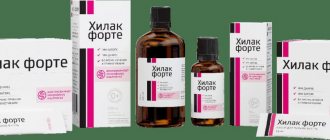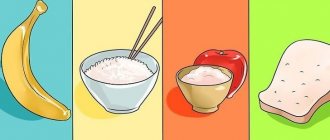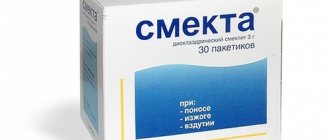Smecta's operating principle and properties
Smecta is a drug intended to eliminate possible intoxication of the body due to constipation. Its basis is white porous clay, which acts in an absorption manner. It removes toxins, bacteria and other pathogenic microflora from the body that can accumulate in it as a result of stool that is not excreted.
Smecta is a natural enterosorbent. Belongs to the 4th generation of these substances.
In case of disturbances in the functioning of the gastrointestinal tract, constipation or diarrhea, Smecta removes bacteria and toxins from the intestines clogged with feces. This is due to its strong adsorptive properties.
Among the properties of the medicine, the main ones are the following:
- The crystal structure of diosmectite, which forms the basis of the drug. Thanks to it, a process occurs in which pathogenic microflora is bound and removed from the body.
- Enveloping ability of diosmectite. It protects the intestines from the penetration of bacteria and toxins and restores the natural protective barrier.
The advisability of using Smecta for difficult bowel movements: a doctor's review
If your doctor has recommended the use of Smecta, it is important to adhere to the recommendations regarding its use. An overdose can only worsen constipation and cause other unwanted side reactions in the body. The active substance of Smecta - diosmectite - is advisable to use in patients with food and drug poisoning. The drug does not directly affect the mechanism of development of constipation.
To cope with defecation difficulties, it is necessary to identify the exact cause of their occurrence. In the future, the doctor recommends a laxative in the form of drops, syrups, suppositories or glycerin suppositories, which soften the stool. Constipation may be an indication of serious dysfunction of the gastrointestinal tract. It is recommended to refrain from self-medication, which can blur the clinical picture and make it difficult to make an accurate diagnosis.
Principles of application
Smecta is available in powder form. Designed for indoor use. Before use, you need to dissolve the powder in 100 ml of water, and stir thoroughly until a homogeneous consistency.
Apply one hour before meals, 3 times a day. It can also be used after meals, after an hour or an hour and a half. The main thing is that food and medicine enter the body separately from each other. This is due to the excretory properties of diosmectite, which, together with pathogenic microflora, also removes beneficial substances obtained from food.
The duration of treatment is up to 7 days.
The daily dose of sorbent depends on the age of the recipient. So, for adults it will be 9 grams, for small children – 3 grams.
The use of the drug is possible from a very early age. Can be diluted in milk or mixture.
The release form of the drug is individual packages weighing 3 grams. The following daily intake is recommended:
- for newborns and children under 1 year – 1 sachet;
- for children from 1 year to 2 years – 2 sachets;
- for children from 3 to 6 years old – 2 or 3 sachets;
- for children over 6 years old and adults – 3 sachets.
In case of severe poisoning on the first day, the dosage may need to be doubled.
Application of Smecta for newborns
Constipation causes intoxication in a child's body, just like in an adult. Smecta is safe for small children, even at a very early age, because... it does not penetrate the blood. Therefore, it is prescribed to infants when intestinal disorders occur.
If a young child experiences constipation, this may not always be a sign of illness. When dysbiosis occurs, unpleasant symptoms such as bloating or constipation also appear.
Dysbacteriosis is a condition caused by a violation of the intestinal microflora. Existing bacteria multiply unevenly, causing an imbalance. Smecta is also applicable to eliminate constipation and other negative consequences of this condition. Diosmectite does not enter the bloodstream, but remains in the intestines, where it affects toxins and bacteria. It is excreted unchanged and does not disrupt the natural intestinal microflora.
The medicine can cope with the following symptoms of intestinal disorder in newborns:
- colic;
- flatulence;
- vomiting, which is accompanied by constipation;
- bloating;
- constipation.
Smecta is also used for preventive purposes when changing the diet in young children. The use of the medicine is useful for frequent regurgitation in young children, diarrhea, dysbacteriosis and poisoning.
The medicine is diluted in milk, mixture, juice or liquid puree. The proportion is the same as for adults - 100 ml of liquid to prepare the solution. It should be divided into 4-5 doses, 20-25 ml of suspension each.
Overdose
An overdose of Smecta can lead to constipation or an allergic reaction to the drug.
If constipation occurs from Smecta, it means that its concentration in the gastrointestinal tract is too high. Both children and adults are advised not to discontinue the drug, but to reduce the dosage. Adults can drink 2 sachets instead of 3 per day; for infants, it is worth diluting the drug in more water or other liquid.
Allergic reactions occur in response to flavoring additives and are quite rare in medical practice.
If itching, fever, spots on the skin or Quincke's edema occur, an allergic person should stop taking the medication and consult a doctor for symptomatic treatment.
Side effects
It is widely believed that this drug, due to the binding effect of the absorbent, on the contrary, increases constipation. This is due to the fact that Smecta has binding properties and is prescribed for diarrhea.
For both diarrhea and constipation, the therapeutic effect is achieved by removing toxins and bacteria from the body that cause intestinal disorders. Smecta does not aggravate constipation and does not cause it.
Smecta is tolerated without side effects in most cases of its use. It does not affect the duration of digestive processes and does not disrupt the bowel movements.
In rare cases, Smecta causes vomiting, skin rashes or fever. “When they appear, you should not completely stop taking the absorbent. Even for young children, pediatricians do not advise doing this. It is enough to reduce the dosage and dilute the powder with more water,” emphasize medical specialists.
Reviews
Elena, 31 years old: “At first we thought that the doctor made a mistake and prescribed the wrong medicine for our baby. But they decided to give it, since it was prescribed. And a day later the constipation went away, everything became as it should.”
Kirill, 24 years old: “Constipation crept up unnoticed. I guess I need to stop eating crap and learn how to cook. I didn’t want to go to the doctor, I googled the symptoms and decided to try Smecta for constipation. Surprisingly, everything went away. I don’t want to suffer anymore, so I’m learning to eat normally.”
Igor, 28 years old: “When we had a boy, we just stopped the doctor. Either the tummy hurts, then there is gas, then there is diarrhea, then there is constipation. At first he said that everything was fine, and then he told us to buy Smecta and give the baby one sachet a day, dividing it 3 times. There have been no complaints for two weeks now.”
Smecta is an effective remedy for constipation caused by pathogenic or nutritional disorders. It is virtually harmless if taken in recommended doses and can be used by both adults and children of any age. A few sachets of Smecta should be in any home medicine cabinet.
The presence of symptoms such as:
- constipation
- nausea
- heartburn
- heaviness after eating
- abdominal or stomach pain
- increased gas formation (flatulence)
If you have at least 2 of these symptoms, then this indicates a developing
gastritis or ulcer.
These diseases are dangerous due to the development of serious complications (penetration, gastric bleeding, etc.), many of which can lead to
outcome. Treatment needs to start now.
Read the article about how a woman got rid of these symptoms by defeating their main cause using a natural method. Read the material…
source: OPischevarenii.ru
Smecta for constipation has quite a lot of positive reviews. The drug belongs to the group of sorbents of natural origin, so in addition to its effectiveness, it is also absolutely safe.
Contraindications
The medicine is not recommended for use in acute constipation or in diseases associated with intestinal obstruction. The use of the medicine is contraindicated in the presence of individual intolerance to the components, fructose.
Before use, you should consult a specialist doctor. Only he will be able to prescribe an appointment correctly and in the right dosage.
The drug Smecta has an absorbent effect on the body when the functioning of the gastrointestinal tract is disrupted. The action is to get rid of pathogenic microflora. Taking into account the fact that the drug is not absorbed into the blood and does not disrupt the functioning of other systems, its presence will not be superfluous in the family medicine cabinet.
What is constipation
Constipation is a defecation disorder in which stool retention occurs for more than two days . Feces are released in small quantities and have a dry consistency. Constipation is characterized by abdominal pain, flatulence, and a feeling of incomplete bowel movement.
This type of digestive disorder occurs due to regular inhibition of the urge to defecate, frequent use of laxatives, and a diet that lacks plant fiber.
Constipation can cause complications, including persistent intestinal obstruction, inflammatory diseases of the digestive tract, and the formation of carcinogens.
Important! In infants, stool retention occurs due to a lack of fluid, which is often observed in babies who are bottle-fed, poor nutrition of the mother or taking medications, or the introduction of complementary foods.
When and how to use
Melon on an empty stomach miraculously cleanses the intestinal walls and normalizes the functioning of the gastrointestinal tract.
To combat excess weight , especially with deposits in the so-called fat traps, melon juice is used in combination with apple and tomato juice.
FROM OBESITY, CELLULITE, EDEMA, TREATS THE LIVER, KIDNEYS, NERVES, EXPELS PARASITES - MELTON.
To remove waste and toxins from the body , nutritionists recommend consuming up to 4 kg of melon per day. The total amount of product is divided into four doses.
To facilitate the process of bowel movements, eat up to 2 kg of melon throughout the day. In one go, you can consume 400 g of pulp and still not give up your usual diet.
Fasting days on melon help to “drain” excess water , reduce body weight, and improve its quality. Take advantage of the most popular options and choose the best method for yourself :
- In the morning, eat 400 g of pulp on an empty stomach and go without food until lunch. The feeling of hunger will not come immediately, since melon saturates perfectly.
- For breakfast and lunch, eat your usual foods, and instead of dinner, enjoy 400 g of melon.
Use one of the options or combine both at your discretion for seven days . This will cleanse and improve the intestinal microflora and lose 2-3 kg.
It will be interesting:
The benefits and harms of melon seeds for the body
What is healthier - watermelon or melon?
In order to consolidate the effect, nutritionists recommend using cleansing diets on an ongoing basis. In this case, you should adhere to certain rules of balanced nutrition so as not to harm the body :
- Add seasonal vegetables and fruits, fresh or boiled, to your menu.
- Avoid dairy and dairy products, meat and fish.
- Do not eat melon on an empty stomach or immediately after your main meal. The melon pulp is best absorbed between breakfast and lunch.
Pediatricians allow melon to be introduced into the diet of children no earlier than 2-3 years, starting from 50 g per day . This amount is gradually increased to 200 g per day, observing the reaction from the gastrointestinal tract.
Cleansing diets are contraindicated for children, but to improve the movement of feces, melon is allowed. This is not only one of the safest laxatives, but also one of the most delicious. Children will definitely not refuse such a delicacy!
Important! Try not to mix melons with starchy vegetables. This leads to excessive gas formation. Maintain a period of 2.5 to 3 hours and proceed to lunch or dinner.
What is Smecta used for?
What kind of drug is Smecta, what does it help with and who can take it?
This medicine is on everyone’s lips – thanks to advertising, recommendations from doctors and pharmacists. It is recommended to drink it for any intestinal disorder or digestive disorder; pediatricians prescribe it for infants
. Is this medicine really so effective and safe?
What is Smecta?
This is a drug that belongs to the group of adsorbents and has an antidiarrheal effect. Smecta is not absorbed into the blood, it works locally - in the stomach and intestines, helping to quickly remove toxins.
The active component of the product is dioctahedral smectite, or diosmectite. This is a natural adsorbent obtained in places where shell rock and white clay are mined.
Additional components are:
- Glucose – gives a pleasant taste and is a source of energy for a patient exhausted by poisoning.
- Sodium saccharin.
- Flavoring : vanilla or orange.
What are the additional components used for? They help give the product a pleasant taste and smell, improve consistency and increase the solubility of the powder in water.
The drug is available in powder form. To take it, dilute it in a small amount of water.
Once in the digestive system, the medicine begins to act in the body within half an hour. The effect of taking it lasts for several hours
. This drug is included in the RLS (Register of Medicines) in many countries around the world.
What is Smecta used for?
The drug performs several functions at once:
- Attracts germs that cause food poisoning. Effective against viruses and bacteria, helps to significantly reduce the number of pathogens.
- Neutralizes, binds and removes toxins, which makes the patient’s condition improve faster.
- Improves the composition of digestive mucus, creating a denser membrane on the mucous membrane. This helps protect it from irritation and quickly restore its integrity and functionality after severe inflammation.
- Increases local immunity of the gastrointestinal tract, does not allow additional infection or activation of opportunistic flora, which improves inflammation, reduces the risk of food infection, and reduces the intensity of the chronic inflammatory process.
- Contains a small amount of sodium, magnesium and potassium, replenishes their deficiency in case of severe diarrhea. Helps quickly restore water balance.
- Effective against bloating and abdominal pain.
Smecta: what does it help with?
Take it when:
- Intestinal infections and food poisoning.
- Diarrhea – Smecta helps stop diarrhea and prevent severe dehydration.
- Nausea and after vomiting , especially with vomiting in children and infants
- Increased gas formation.
- Heartburn – helps protect the mucous membrane from excess hydrochloric acid.
- Inflammatory diseases of the gastrointestinal tract , disorders of the intestinal microflora, which is why stool disorders are often observed.
- Allergic food reactions.
- Intoxications.
- Diarrhea caused by taking certain medications.
What causes diarrhea? The most common causes are the entry of pathogenic bacteria and viruses through dirty hands and dishes, the proliferation of bacteria and mold in products, and an imbalance of intestinal microflora. In these cases, Smecta helps eliminate the immediate cause of intestinal irritation.
Some women drink Smecta to lose weight. The drug helps eliminate accumulated toxins, thereby normalizing digestion. The enveloping effect helps reduce appetite.
Related article: What are sorbents and what drugs belong to them?
But long-term use (more than 7 days) is not recommended - there is a high risk of developing chronic constipation. Therefore, the recommended course of taking the drug is 3-5 days - this is enough to feel relief. But you won’t be able to seriously lose weight on Smecta.
Loading …
What else can you take this drug for?
It helps get rid of acne . Rash on the face and body is often associated with digestive disorders and the accumulation of toxins in the intestines. Due to untimely and incomplete cleansing of the intestines, the body tries to remove toxins through the skin along with sebum.
The ducts of the sebaceous glands become clogged, causing inflammation and acne. Cleansing the body of poisons helps reduce the number of rashes
. In this case, the drug is taken for no more than 7 days: during this time it manages to have a beneficial effect on the body and remove toxins.
Patients are often interested in what else this remedy helps with: Smecta strengthens or weakens, can it be used for intoxication and intestinal inflammation caused by frequent constipation? The drug is antidiarrheal and fixative. If you have chronic constipation, it is not advisable to drink it.
How long does it take for smecta to work?
The average absorption time of the product is 30-60 minutes
. But in case of poisoning, the absorption function in the intestines is often impaired, which is why it will take longer for the drug to take effect.
Usually the patient feels significant relief from his condition after 2-3 doses (by the end of the first day of treatment). To completely remove toxins, you need to drink Smecta for at least 3 days. The product effectively treats food, chemical and other types of poisoning.
How long it takes for the remedy to take effect depends on the symptoms. If the patient has severe vomiting, the drug may come out without having time to have a therapeutic effect. In this case, it is recommended to take it after gastric lavage or if there is no vomiting for at least half an hour. Another way is to dissolve the powder in a small amount of water (50 ml).
How long it takes for the medicine to take effect also depends on how full the stomach is. If you take it for stomach pain after eating, the effect will be delayed.
It is much more effective to drink it an hour before or an hour after a meal - this makes the drug more effective.
Related article: How to replace Enterosgel? Analogues for adults and children
Why does Smecta help adults?
In an adult, the digestive system is more resilient, so it often copes with pathogenic microbes on its own. On the other hand, the presence of chronic gastrointestinal diseases significantly weakens local immunity, in this case food poisoning provokes an exacerbation of the underlying disease.
Smecta will help you cope with the disease at home. But if the condition does not improve within 1-2 days and at a high temperature against the background of a gastrointestinal disorder, urgent help from a specialist is needed who can find out why the patient developed this condition and help choose the most effective treatment.
For adults, Smecta is used for:
- Exacerbation of gastrointestinal diseases associated with inflammation and disruption of the integrity of the mucous membrane of the digestive tract, and is also useful for chronic infections (bacterial colitis, Helicobacter-associated gastritis).
- Intestinal infections.
- Food, alcohol and other poisoning.
- Pain and bloating when overeating.
- Allergic reactions – helps bind and remove allergens.
- Digestive disorders (from diarrhea and nausea) associated with eating disorders, as well as after eating new exotic foods.
It helps to quickly relieve unpleasant symptoms, remove toxins from the body, and protect the digestive system from the spread of the inflammatory process.
Pregnant and lactating
Smecta is safe for women who are preparing to become mothers or are breastfeeding. It is not absorbed into the blood, so it cannot pass from the mother’s body to the child.
In case of poisoning, it is necessary, as it allows you to quickly neutralize poisons before they are transmitted to the child through the bloodstream, from which poisoning can develop in the baby.
But it can only be taken if the woman is sure that she has food poisoning and not a more serious illness (appendicitis, peritonitis).
Smecta helps relieve severe attacks of toxicosis in the early stages. It is also necessary to follow the recommended dosage and not exceed it.
Smecta for diarrhea for children
This remedy is safe and quickly helps normalize the child’s condition. Many mothers are interested in: at what age is Smecta used for babies, what does it help with - only against poisoning or can Smecta be given to a child with colic?
Already from 1 month you can use it at the first signs of an intestinal infection, or with a severe cold - to remove toxins produced by microbes. It can be given to a small child when the abdomen is bloated - for quick and painless relief from gas. And for newborn jaundice, this medicine is prescribed already on the 2-3rd day of the baby’s life.
It is worth remembering that until the age of three, a child does not have his own intestinal microflora. Any foodborne infection is complicated; diarrhea can last for several days - not because of the infection itself, but because of a disturbance in the microflora. Therefore, after taking Smecta, children need a course of probiotics.
What does Smecta help elderly patients with and in what cases can they take it?
The drug can also be taken by older people. But this should be done with caution if you have a tendency to constipation, which happens quite often in old age.
Related article: What are sorbents and what drugs belong to them?
Smecta has a constipating effect and can lead to severe constipation. In this case, it is necessary to either reduce the dosage or replace Smecta with analogues - use Bifiform, Polysorb, Motilium and others.
Bifiform Motilium Polysorb
Smecta helps with overeating, eating highly fatty foods, while taking a large number of medications - which worsens the condition of the intestinal microflora.
Instructions for use: dosage and rules of administration
The powder is dissolved in water: for adults you will need half a glass, for children - 50 ml. Children usually like the pleasant fruity aroma. But if the child refuses to drink the water solution, you can dilute the powder in juice, broth or formula. Can be added to food - in small quantities.
The prepared liquid solution cannot be stored: you need to drink it completely within 10 minutes.
When to drink it: before meals or after?
The drug is taken before or after meals, at intervals of about an hour and a half. You should not eat immediately after taking it: otherwise the entire effect of the drug will be aimed at neutralizing food, which will reduce the effectiveness several times.
If the patient has acute inflammation of the esophagus or a chemical burn, the drug should not be taken on an empty stomach - only some time after eating. It is advisable not to eat for an hour and a half after taking it. This helps the drug act more effectively, resulting in faster recovery.
When taken simultaneously with other medications (even if they are tablets for the treatment of intestinal infections), Smecta neutralizes them. Therefore, the difference in appointment time should be at least 2 hours - the doctor’s prescription usually takes this into account.
The daily dosage is:
- For infants up to one year - no more than 2 sachets.
- Children under 2 years old - 4 sachets in the first 3 days (this helps the child’s body get rid of intoxication faster), then 2 sachets.
- 3-12 years for acute poisoning - 4 sachets, then 2. For the treatment of gastrointestinal diseases - 2-3 sachets.
- For children over 12 years of age and adults, no more than 6 sachets per day for acute intestinal infection, 3 for further treatment and during the treatment of chronic gastrointestinal inflammation.
In what cases should you not take Smecta?
Contraindications are:
- Individual intolerance (if side effects occur while taking it - skin rashes).
- If you are prone to constipation.
- Digestive problems that are not accompanied by diarrhea and vomiting.
- For intestinal obstruction.
- If the process of absorption of liquid from the digestive tract is severely impaired.
Is an enema with Smecta necessary for poisoning? It is not necessary. The injected liquid will quickly leave the body, especially against the background of diarrhea. Smecta will help more if taken in the traditional way.
Source: https://otrav.net/ochishhenie-organizma/dlya-chego-primenyayut-smektu/
Banana strengthens or weakens
There is an established opinion that an unripe banana strengthens, and a ripe banana weakens. This statement is partly true.
Unripe fruit contains a lot of starch, which is a plant polysaccharide. It is poorly digested in the duodenum and small intestine. Hence the claim that green banana strengthens the intestines.
At the same time, moderate consumption of an unripe product (1-2 pieces per day), in the absence of contraindications, cannot significantly affect the digestive system.
Bacterial decomposition of plant polysaccharide occurs directly in the large intestine, where it is converted into glucose. The formed compound in turn breaks down into water and carbon dioxide. The last component, as a rule, causes flatulence.
Additionally, when starch decomposes, it forms organic acids, which promote the development of beneficial microflora and have anti-inflammatory properties.
Unripe fruits can primarily cause constipation in infants due to the immaturity of the digestive system. If your child has frequent problems with bowel movements, it is better to avoid bananas.
Ripe fruits, unlike green ones, contain virtually no starch. As the fruit ripens, the polysaccharide is converted to glucose.
The laxative effect is primarily exerted by the dietary fiber contained in the pulp. They improve peristalsis, retain moisture in the intestinal lumen, thereby promoting soft stools and cleansing the organ of waste and toxins.
In addition, the plant product has a choleretic effect, which has a beneficial effect on intestinal motility.
Exceeding permissible doses
When using the medication in large quantities, an allergic reaction or constipation develops. In this case, the dosage of the medicine needs to be reduced. For children, it is recommended to dilute the drug in more liquid, and for adults to drink not three, but 2 sachets per day.
If a severe allergy develops, drug treatment is stopped and symptomatic therapy is carried out.
Situations in which Smecta is strictly contraindicated
Despite its safety and positive effect on the condition of the stomach and intestines, there are certain categories of patients for whom the use of Smecta in the treatment of constipation is strictly contraindicated. Diseases in which the use of the drug can only aggravate the situation are most often mechanical in nature.
These are severe constipation of a chronic nature or cases of acute intestinal obstruction. In the best case scenario, Smecta, drunk by patients suffering from such problems, simply will not have any effect. They can only be removed mechanically or surgically.
In rare cases, acute food allergies may occur due to additives designed to improve the taste of the medicine. In this case, you should immediately stop using Smecta by contacting a doctor who will help you choose a product that does not contain the same components.
It is important to remember that when using Smecta in parallel with any other medications, their effectiveness is significantly reduced.
Sources:
Vidal : https://www.vidal.ru/drugs/smecta__21502 GRLS : https://grls.rosminzdrav.ru/Grls_View_v2.aspx?routingGu >
Found a mistake? Select it and press Ctrl + Enter
Smecta for constipation is a safe powder drug that helps empty the intestines of feces. Thanks to its natural ingredients, the sorbent has gained popularity among users in eliminating defecation problems in adults and children. Helps quickly remove toxic elements and waste from the body.
Side effects and contraindications for use
side effects in people of any age and gender:
:
- Constipation;
- Bloating;
- Vomit;
- Allergic reactions (urticaria, rash, skin itching, Quincke's edema).
Constipation and bloating usually go away quickly on their own after stopping the use of Smecta or after reducing the dosage.
The use of Smecta powder is contraindicated
if a person has the following diseases or conditions:
- Intestinal obstruction;
- Fructose intolerance;
- Glucose-galactose malabsorption syndrome;
- Sucrase-isomaltase deficiency;
- Individual hypersensitivity to the components of the drug.
In what cases is Smecta prescribed?
After reading the instructions for use of the drug, many people have questions about why the doctor prescribed this particular remedy. Indeed, the package insert states that the indication for treatment with this medicine is diarrhea. Moreover, there are often cases when, on the contrary, constipation occurs after Smecta .
So what is the essence of this treatment?
First, we should dispel the myth that Smecta is a bonding agent. The drug contains a natural component that has adsorbing, gastroprotective and enveloping properties. Its action is aimed at cleansing the intestines of accumulated pathogenic bacteria and removing toxic substances from the body.
We also recommend paying attention to Acipol. Reviews from adults confirm the effectiveness of this drug.
Smecta for bad stool is prescribed in the following cases:
- food poisoning;
- allergic constipation;
- lack of bowel movements due to poor nutrition;
- disruptions in intestinal function due to a cold or influenza;
- intestinal infections;
- dysbacteriosis;
- constipation, caused by long-term use of certain medications.
In addition, Smecta perfectly helps eliminate the symptoms of intestinal colic and flatulence, so it is often prescribed to newborns and women in the postpartum period. The drug is also effective for constipation caused by dysfunction of the digestive system, intestinal dysfunction and gastric pathologies such as gastritis, esophagitis, etc.
Treatment of constipation in children of all ages










